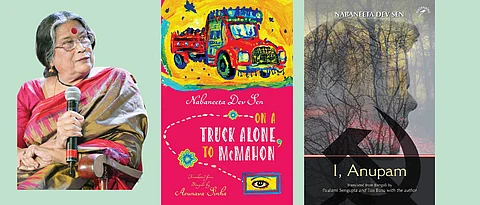

Nabaneeta Dev Sen once said she took up the pen because there was no escape for her as “everybody who came to our house, was a writer”. It was a typical witty take on her childhood, the sort of sharp humour that pervades most of the engrossing large body of works spanning all literary genres which Dev Sen effortlessly delved into.
Dev Sen was a brilliant student, internationally acclaimed academician, linguist, polyglot, thinker, a liberal, a curious globe trotter, and one who fearlessly expressed her mind on various issues affecting the society and the polity. Born in Kolkata (then Calcutta) on January 13, 1938, to the poet-couple Narendra Dev and Radharani Devi, Dev Sen delightfully listened to her mother reading out to her poems from Rabindranath Tagore’s immortal composition for children Sishu (child).
But her childhood was really shaped by the historic happenings of the period. The experience of living in air raid shelters during Second World War, the famine of 1946 when she saw “famished people begging for a morsel of thrown away rice water” and dogs fighting with men and women for leftover food in the dustbin, left an indelible impression on the small girl’s mind.
After the country’s Partition, suddenly, the city seemed to be teeming with people, all struggling to make a living and begin life afresh. Dev Sen grew up in this milieu, and her scholarship took root in some of the finest institutions of the city — Gokhale Memorial Girls’ School, Lady Brabourne College, Presidency College and Jadavpur University from where she obtained her MA degree.
Side by side, her literary endeavours took flight. Dev Sen’s first collection of Bengali poems Pratham Pratyay was published in 1959, months before she got married to economist Amartya Sen and moved to England. Interestingly, her second book came out in the 1970s after she got divorced from Sen. In between, however, she wrote poems, with some of the compositions poignant in their portrayal of the marriage breaking up and her painstaking effort to hold on to her life. Her first novel Ami Anupam (1976) was about the Naxalite movement, and also talked about the intellectual dilemma of the so-called intellectuals of Bengal during those turbulent times.
In all, Dev Sen has to her credit close to 100 books spanning almost all literary genres — Bengali poetry, short stories, plays, novels , literary criticism, essays, travelogues, humour writing and translations.
She also delved into children’s literature, churning out popular and engrossing fairy tales and adventure stories, with girls as protagonist. Dev Sen gave credit to her parents. “Both of them were children’s writers. My father edited a children’s magazine for 25 years,” she once said.
Dev Sen, who retired as professor at Jadavpur University in 2002, researched for years on Ramkatha, playing a pioneering role in analysing it from Sita’s point of view. Chandrabati Ramayan is one of her memorable works. Venerated writer Sirshendu Mukhopadhyay doffed his hat to Dev Sen.
“She was so full of life. She was like a dynamo, a prolific writer. Whichever literary genre she delved in, she struck gold. She was witty and had her own style of writing. Whenever she sat beside me, I could sense her life force. She had asthma since childhood, she often suffered, but I never heard her complaining about her health or remaining glum,” he said.
Dev Sen won the Sahitya Akademi for her autobiographical humour writing Nati Naba-Nita in 1999, and a year later was honoured with the Padma Shri — the fourth highest civilian award in India. Celebrated Bengali poet Joy Goswami referred to some “priceless serious essays” penned by Dev Sen. “It was from her that we got serious essays like Ishwarer Protidwandi o Anyanyo (God’s Rival and Others). Another great series was Bhalobasar Baranda. From college goers to 80 year olds, everybody waited for these pieces,” he said.
Writing for children, however, seemed her biggest passion. “As long as I can write, I hope and pray, I can write for children, and children read me,” she said at the age of 80. But with her advanced years, realisation dawned on Dev Sen that life is not a fairy tale. “You have to make it a fairy tale. You have the right and power to make it a fairy tale,” she advised youngsters. Nabaneeta Dev Sen passed away on November 7, 2019.
